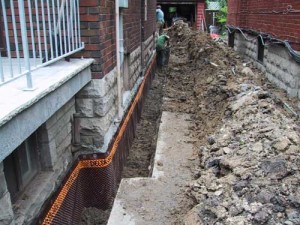 Many basement leaks occur at the beginning of spring, when the snow starts to thaw and the rain is coming down. Why? This is because the subsoil in the middle of the backyard is still frozen, but the soil closer to your house foundation is not. Water follows the path of least resistance, meaning it’s headed straight to your house. Issues in your waterproofing system will allow the water to find the perfect spot to enter into your basement.
Many basement leaks occur at the beginning of spring, when the snow starts to thaw and the rain is coming down. Why? This is because the subsoil in the middle of the backyard is still frozen, but the soil closer to your house foundation is not. Water follows the path of least resistance, meaning it’s headed straight to your house. Issues in your waterproofing system will allow the water to find the perfect spot to enter into your basement.
Possible basement troubles in spring
There are many possible troubles that a homeowner can encounter during the spring season if the basement is not waterproofed well:
- Mould grows easier in a humid environment. This is a serious side-effect of a leaky basement, since it can introduce dangerous health hazards to you and your family. Mould’s effects on the body can include sinus infections, asthma attacks and even allergic reactions. Black mould is the most dangerous type of mould due to its toxicity which can lead to respiratory and pulmonary problems.
- Structural damage is another common problem caused by basement leaks in spring. Water usually sits around the foundation of the house, which can put pressure against the foundations and cause the wall to move inward, crack, or create weak spots in which the water can enter easily.
- Bugs are also attracted to moist environments. Carpenter ants, termites, roaches, and other bugs can appear in a wet basement during the spring, possibly leading to an infestation.
- Lowered house value: Houses with basement problems tend to stay on the real estate market much longer, and those problems can lower the market price.
How you can detect possible leaks before spring time
There are some early signs of a basement leak that a homeowner can look for in order to detect a problem in the waterproofing system before spring time, when the snow melts. Some of the most common causes are:
- Presence of mould or efflorescence
- Cracks in walls or floors
- Rust stains on appliances and metal objects
- Dark stains on wood
- Bugs
In order to prevent basement leaks, there are few things that can be done.
- Gutters: prevent them from overflowing by cleaning them of leaves and making sure that the downspouts are well installed, at least 10 feet from the house.
- Slope: pavement and landscape tends to create a slope towards the house with time. In order to prevent spring basement leaks, the slope should face away from the house.
- Irrigation: lawn irrigation should be placed far from the house to prevent moisture.
Spring real estate market and leaky basement problems
If you are planning to sell a house with a leaky basement, you should be aware that this problem can affect the price of the house, as well as the number of offers received. Fixing any leaks and/or waterproofing the basement would be beneficial in boosting your selling price.
If, on the contrary, you are considering buying a house, it is important that you contact an independent home inspector to perform a full inspection of the house, paying special attention to the basement. Using moisture meters and thermal imaging, inspectors can detect any humidity and/or leaks in the basement, which will give you an advantage when negotiating the price of the house.
